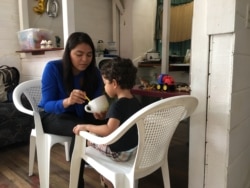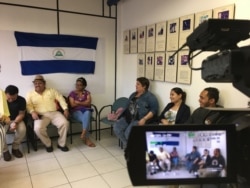Her father’s words finally convinced Leticia Gaitán it was too dangerous to be a journalist in Nicaragua.
After a month of protests and unrest, the government of Daniel Ortega had launched a media crackdown to extend its control of the country. Reporters, visual journalists, columnists and others had increasingly become targets – subject to threats, arrest, detention or unpredictable violence.
“What are you waiting for?” her father told Gaitán. “If they get you, they will rape and torture you.”
So in April, Gaitán left her 2-year-old child and family behind, joining an exodus of some 50 Nicaraguan journalists who fled the country amid the crackdown’s grim climate of fear and intimidation.
Most have landed in San Jose, Costa Rica, where they have struggled to adapt and survive. But they are also finding solidarity with their journalist colleagues – and inventing ways to keep their reporting alive.
Voice of America traveled to San Jose to hear their stories.
‘Inciting hate’
Gaitán, who worked at the independent news channel 100% Noticias, she left in part to avoid the same fate as two of her colleagues. Last December, Miguel Mora, the director and founder of the channel, and reporter Lucia Pieda, had just finished a daily broadcast when special forces burst into the station.
The two were detained and charged for ‘inciting hate’ and terrorism. They ultimately spent 172 days in Nicaraguan prisons, much of it in solitary confinement, until their release in June under an amnesty.
"My dad tells me: 'You told me that you were going to leave when Miguel Mora was taken prisoner,’ ” Gaitán recalled.
Gaitán said she already had been attacked by Nicaraguan paramilitaries who pointed to their guns, pushed her to the ground and robbed of her recording equipment.
Before leaving, she cried for what was happening to her country. Gaitán hired a Coyote to help cross to Costa Rica. Her husband and son were smuggled separately; they now live together in a small Costa Rican apartment.
Turn for the worse
The exiled reporters agree that being a journalist in Nicaragua has never been easy.
But conditions worsened after the large-scale protests and riots against the government of President Daniel Ortega in April 2018.
Initially, protesters said they were unhappy with proposed pension reforms. As the unrest spread, corruption in the Ortega regime and police brutality became the focus of much reporting.
The government forced cable operators to block independent news channels. Human rights groups said more than 300 people were killed during the demonstrations, mostly by security forces. One journalist, Angel Eduardo Gahona, was shot and killed while covering a protest in eastern Nicaraugua.
After the protests, media intimidation and repression only worsened, the journalists said.
The prominent Nicaraguan journalist Carlos Fernando Chamorro, owner and news director of the website Confidencial and host of the TV programs “This Night” and “This Week”, was arrested by police in December 2018.
Chamorro eventually was released and has been living in Costa Rica since January. He said that before the demonstrations, there was pressure on journalists but at least some media freedom.
“There was exclusion, there was a monopoly on television and radio control, but the regime could still be challenged on corruption by reporters and investigations," he said.
Once the protests began, he said, the news media became “an enemy of the government.”
“After that first day of uprising, there were attacks on reporters, persecution, censorship, murders, all to criminalize the exercise of journalism,” he said.
Chamorro continues his reporting about Nicaragua from the studios of Costa Rica Teletica. The rest of his team remains at work inside Nicaragua.
Constant threats
For Hector Rosales, the constant harassment finally became too much to bear.
“The threats from the Sandinistas and their supporters were constant in my village of Masatepe,” says the former reporter and anchor at Vos TV and Canal 14.
Rosales did a video report about the Masatepe vice-mayor distributing mortars to Ortega supporters during the April protests. He said he was attacked on social media.
After the arrest of Pineda and Mora, “They allegedly issued an arrest warrant against other journalists, and I was on that list,” Rosales said. “A colleague alerted me that we had to leave the country."
Before he could, Rosales was attacked on the street by four men who hit him in the mouth. After 15 years as a journalist, he left Nicaragua with just a backpack and few items of clothing.
"We didn't know what awaited us on that journey," he said.
Refugees with a purpose
Journalists are just a tiny fraction of the 50,000 people the U.N. High Commissioner for Refugees says have fled Nicaragua since the protests.
Costa Rica, a small nation of 5 million, has had at least two thousand refugee requests.
As with any refugee, the journalists struggle to survive.
Gaitán said she began working as a cashier in a store just to pay for food. But she kept her sights on the goal of getting back into journalism. "I said even if it costs me, I will continue my course, my profession, which is journalism," she said.
She eventually joined four other journalists who are producing Nicaragua Actual, a web broadcast they launched this year on March 1, Journalist's Day in Nicaragua. The show, appearing weekdays on YouTube and Facebook, focuses on news from around Nicaragua.
It’s a shoestring operation.
"There are days that we don't have (money) for rent or we don't have (money) for food, but we believe we are doing the right thing," she said.
Pineda is among those now in Costa Rica. She and colleague Mora recently were among journalists chosen to receive the 2019 International Prize for Freedom of the Press by the Committee to Protect Journalists in New York City.
Chamorro said that while it’s difficult to work from afar, enduring the separation from family, friends and colleagues who may still face danger is much worse.
He yearns to go home.
“I came to Costa Rica with the conviction that I was coming to a short exile. I have been six months now and I would not want to end the year in Costa Rica," he said.
"My heart, mind, my anxiety and my conviction are in Nicaragua.”






